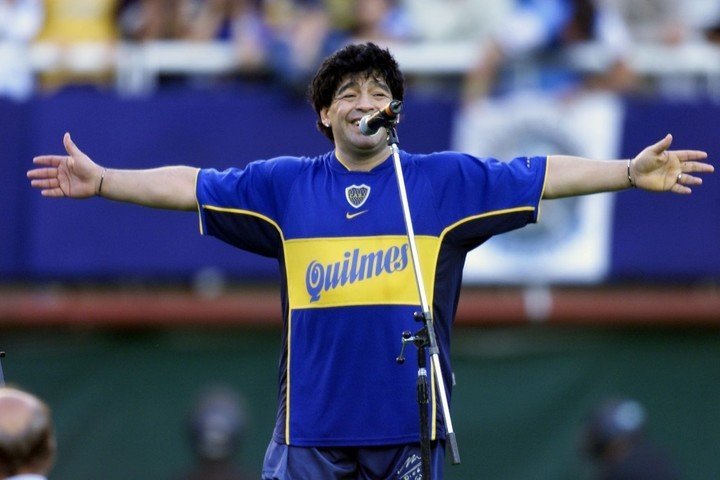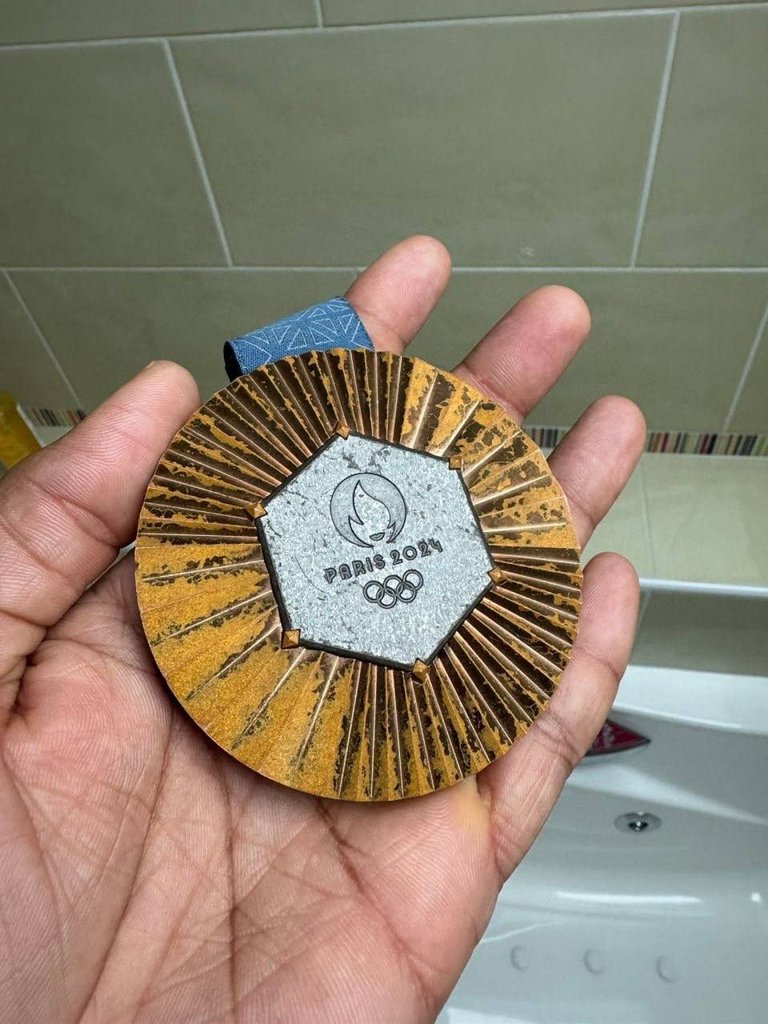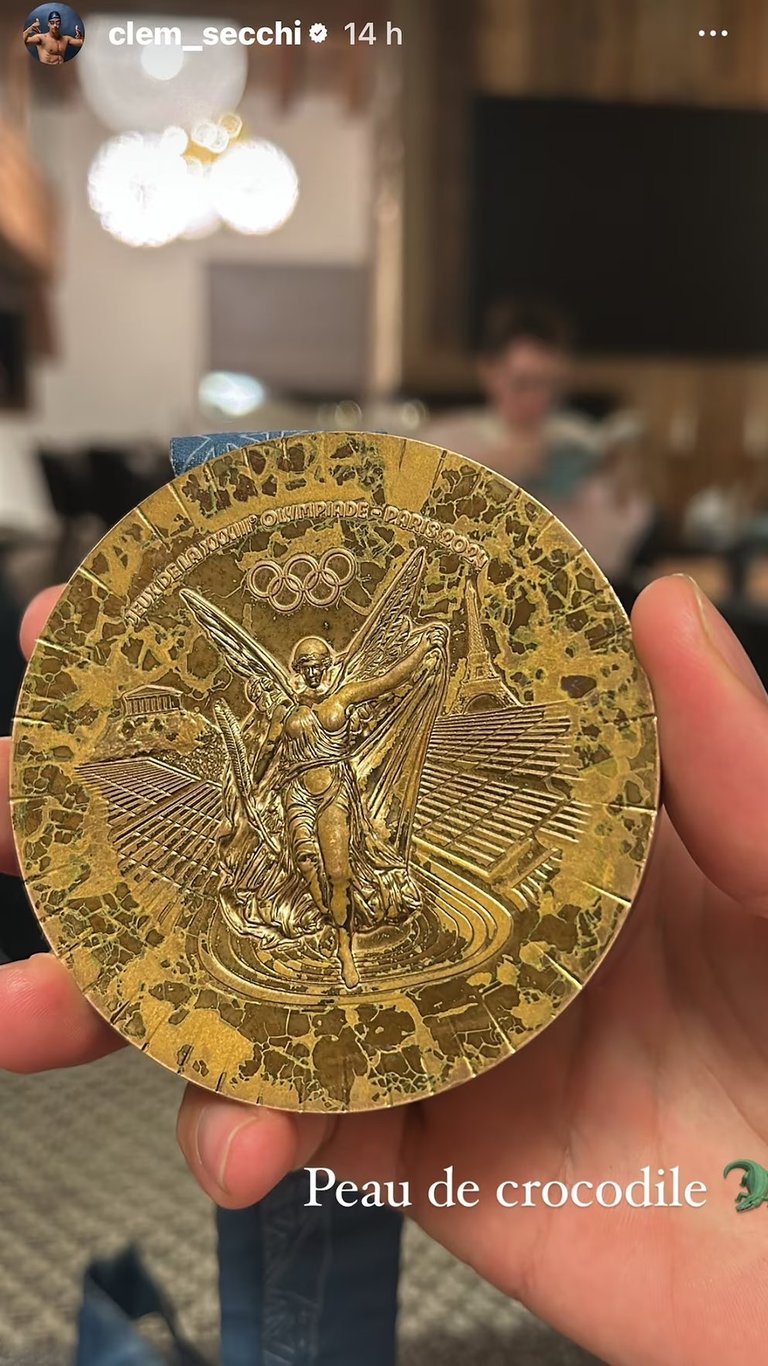
Todavía suena en los oídos de todos los que ese día de noviembre de 2001 estábamos pendientes del discurso que Diego Maradona daba ante 50.000 personas en La Bombonera, el famoso estadio del club Boca Juniors. Era su despedida, se retiraba luego de una carrera plagada de enormes éxitos deportivos y muchos problemas personales de todo tipo.
En ese discurso, Maradona visiblemente emocionado, soltaba una frase que se convirtió en una de las más icónicas en el ambiente futbolístico mundial: "la pelota no se mancha". La dijo en una clara alusión a sus múltiples errores, sus problemas de droga, familiares y también con la prensa, pero dejó en claro que su amor por el fútbol y la pelota seguía siendo puro como el primer día.

Los metales preciosos como el oro y la plata no deberían deteriorarse y por ello son los componentes elegidos para darles como premio a los triunfadores en los deportes olímpicos, algo más complicado es el metal elegido para premiar al que sale tercero en esas mismas competencias, el bronce que es una aleación de cobre y estaño, aunque puede contener otros metales en menor proporción. Qué curioso que se haya elegido esa aleación para representar el premio al que ocupa el tercer lugar en una competencia olímpica. Para dar eso, mejor darle premio solo a los dos primeros.
Es problemático el tema, si no me creen pregúntenles a los organizadores, diseñadores y fabricantes de las medallas que se dieron en la última olimpíada realizada a mediados del año anterior en París. Las preseas se están deteriorando y al momento más de 100 atletas han pedido el reemplazo.

En agosto pasado, a poco menos de un mes de finalizada la competencia, un atleta estadounidense de florete, publicó fotos de su medalla de bronce totalmente oxidada y manchada. Y no sólo hay problemas con las de bronce, también las de oro y plata tienen inconvenientes, aunque en menor medida.
Lo increíble es que detrás de este affaire está un imperio de artículos de lujo que es propiedad de la familia más rica y poderosa de Francia, LVMH (Louis Vuitton, Moët y Hennessy). Desde el champagne, pasando por la ropa de los atletas franceses y hasta el equipaje, formaron parte de la exhibición y promoción de artículos del conglomerado de empresas del grupo, aun contraviniendo el espíritu amateur de las Olimpíadas. Si bien estas promociones fueron muy fuertes, el papel preponderante y más significativo estuvo dado por las medallas que fueron diseñadas por el fabricante de joyas y relojes de lujo Chaumet, empresa perteneciente al mismo grupo LVMH.

Algunos atletas franceses se hicieron eco del problema y mostraron en sus redes sociales el deterioro de las medallas, "piel de cocodrilo" mencionan para indicar como las preseas se desgranan. Aparentemente el mayor problema estaría en el barniz que se utilizó para bañar el metal, lo que debía proteger terminó siendo el enemigo y principal causante del deterioro.
Un vocero de LVMH ha declarado que ellos no tienen nada que ver ya que no las han fabricado ni son responsables, pero olvida mencionar que la propia firma mostró con orgullo a los diseñadores de Chaumet a pocos pasos de la residencia presidencial francesa anunciando un proyecto de un año para diseñar las medallas.
Ya antes ha pasado algo similar, en Río 2016 debieron reemplazar las medallas ya que ni siquiera las de oro y plata habían sido construidas con esos metales nobles. Pero nunca antes una empresa de tanta envergadura había estado detrás de las medallas olímpicas, una empresa cuya razón de ser es la precisión y la calidad.
Costos, dinero, los malditos de siempre corroyendo al deporte, más que el barniz elegido.
Finalmente, Maradona tenía razón, lo único que no se mancha, que permanece inmutable a lo largo del tiempo es el amor por el deporte, ni en el oro se puede confiar.
Gold is stained
It still rings in the ears of all of us who, on that day in November 2001, listened to Diego Maradona's speech before 50,000 people at La Bombonera, the famous stadium of the Boca Juniors club. It was his farewell; he was retiring after a career full of enormous sporting successes and many personal problems of all kinds.
In that speech, Maradona, visibly moved, uttered a phrase that became one of the most iconic in the world football environment: "The ball does not get dirty." He said it in a clear allusion to his many mistakes, his drug problems, his family problems, and his dealings with the press, but he made it clear that his love for football and the ball was still as pure as the first day.
Precious metals such as gold and silver should not deteriorate and that is why they are the components chosen to be awarded as prizes for the winners in Olympic sports. A bit more complicated is the metal was chosen to award the third place winner in these same competitions, bronze, an alloy of copper and tin, although it can contain other metals in smaller proportions. How curious that this alloy was chosen to represent the prize for the third place winner in an Olympic competition. To give that, it is better to only award the prize to the first two.
The issue is problematic; if you don't believe me, ask the organizers, designers, and manufacturers of the medals that were awarded at the last Olympics held in the middle of last year in Paris. The medals are deteriorating and so far more than 100 athletes have asked for replacements.
Last August, less than a month before the end of the competition, an American foil athlete published photos of his bronze medal completely rusted and stained. And it's not just the bronze medals that are having problems, the gold and silver medals are also having problems, although to a lesser extent.
The incredible thing is that behind this affair is a luxury goods empire owned by the richest and most powerful family in France, LVMH (Louis Vuitton, Moët, and Hennessy). From champagne to the clothing of French athletes and even luggage, they were part of the exhibition and promotion of articles from the conglomerate of companies of the business group, even contravening the amateur spirit of the Olympics. Although these promotions were very strong, the predominant and most significant role was played by the medals that were designed by the luxury jewelry and watch manufacturer Chaumet, a company also belonging to the same LVMH group.
Some French athletes have echoed the problem and have shown on their social networks the deterioration of the medals, "crocodile skin" they use to indicate how the medals are peeling off. Apparently the biggest problem is the varnish that was used to coat the metal, which was supposed to protect it but ended up being the enemy and the main cause of the deterioration.
A spokesperson for LVMH has stated that they have nothing to do with it since they did not manufacture them nor are they responsible, but forgets to mention that the firm itself proudly showed Chaumet designers a few steps from the French presidential residence announcing a one-year project to design the medals.
Something similar has happened before, in Rio 2016 they had to replace the medals since not even the gold and silver ones had been made with these noble metals. But never before had a company of such magnitude been behind the Olympic medals, a company whose reason for being is precision and quality.
Costs, money, the usual curses corroding sport, more than the chosen varnish.
Finally, Maradona was right, the only thing that does not stain, that remains unchanged over time is the love for sport, not even gold can be trusted.
Héctor Gugliermo
@hosgug
Genial, como siempre.
Y, no solo Diego, que para mí es intocable, necesario e imprescindible. Genial su publicación.
Que manera de aprender.
Lo de las medallas en París 2024 ha Sido algo bochornoso y han sido varios los atletas que se han quejado.
Feliz jornada. Salud y saludos.